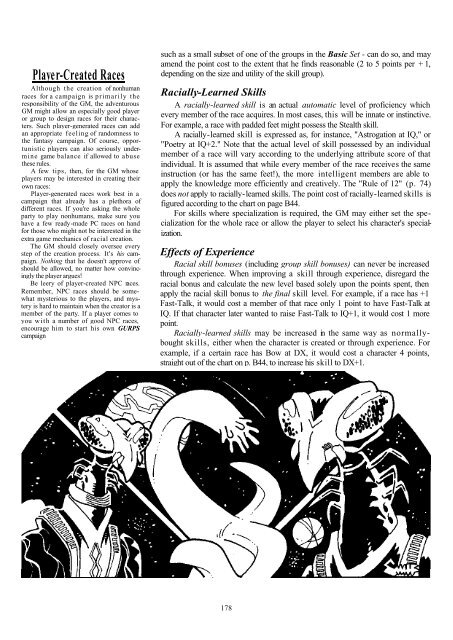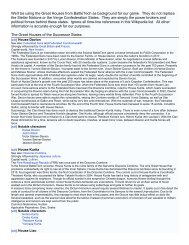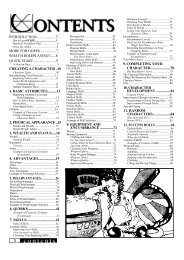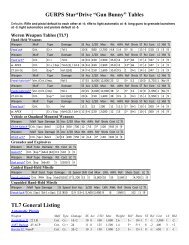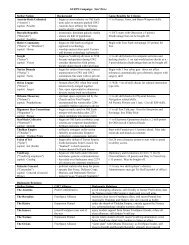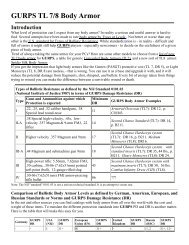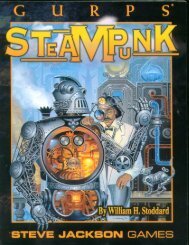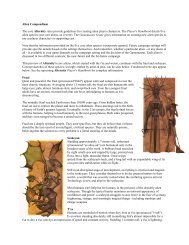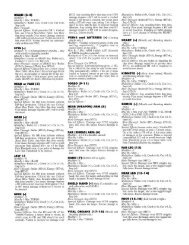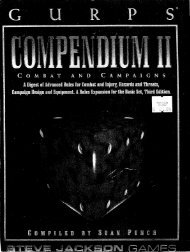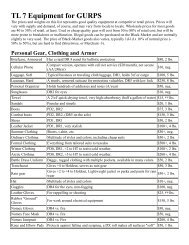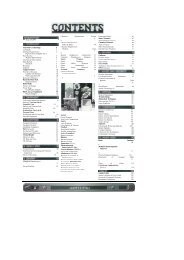GURPS - Compendium 1..
GURPS - Compendium 1..
GURPS - Compendium 1..
Create successful ePaper yourself
Turn your PDF publications into a flip-book with our unique Google optimized e-Paper software.
Player-Created Races<br />
Although the creation of nonhuman<br />
races for a campaign is primarily the<br />
responsibility of the GM, the adventurous<br />
GM might allow an especially good player<br />
or group to design races for their characters.<br />
Such player-generated races can add<br />
an appropriate feeling of randomness to<br />
the fantasy campaign. Of course, opportunistic<br />
players can also seriously undermine<br />
game balance if allowed to abuse<br />
these rules.<br />
A few tips, then, for the GM whose<br />
players may be interested in creating their<br />
own races:<br />
Player-generated races work best in a<br />
campaign that already has a plethora of<br />
different races. If you're asking the whole<br />
party to play nonhumans, make sure you<br />
have a few ready-made PC races on hand<br />
for those who might not be interested in the<br />
extra game mechanics of racial creation.<br />
The GM should closely oversee every<br />
step of the creation process. It's his campaign.<br />
Nothing that he doesn't approve of<br />
should be allowed, no matter how convincingly<br />
the player argues!<br />
Be leery of player-created NPC races.<br />
Remember, NPC races should be somewhat<br />
mysterious to the players, and mystery<br />
is hard to maintain when the creator is a<br />
member of the party. If a player comes to<br />
you with a number of good NPC races,<br />
encourage him to start his own <strong>GURPS</strong><br />
campaign<br />
such as a small subset of one of the groups in the Basic Set - can do so, and may<br />
amend the point cost to the extent that he finds reasonable (2 to 5 points per + 1,<br />
depending on the size and utility of the skill group).<br />
Racially-Learned Skills<br />
A racially-learned skill is an actual automatic level of proficiency which<br />
every member of the race acquires. In most cases, this will be innate or instinctive.<br />
For example, a race with padded feet might possess the Stealth skill.<br />
A racially-learned skill is expressed as, for instance, "Astrogation at IQ," or<br />
"Poetry at IQ+2." Note that the actual level of skill possessed by an individual<br />
member of a race will vary according to the underlying attribute score of that<br />
individual. It is assumed that while every member of the race receives the same<br />
instruction (or has the same feet!), the more intelligent members are able to<br />
apply the knowledge more efficiently and creatively. The "Rule of 12" (p. 74)<br />
does not apply to racially-learned skills. The point cost of racially-learned skills is<br />
figured according to the chart on page B44.<br />
For skills where specialization is required, the GM may either set the specialization<br />
for the whole race or allow the player to select his character's specialization.<br />
Effects of Experience<br />
Racial skill bonuses (including group skill bonuses) can never be increased<br />
through experience. When improving a skill through experience, disregard the<br />
racial bonus and calculate the new level based solely upon the points spent, then<br />
apply the racial skill bonus to the final skill level. For example, if a race has +1<br />
Fast-Talk, it would cost a member of that race only 1 point to have Fast-Talk at<br />
IQ. If that character later wanted to raise Fast-Talk to IQ+1, it would cost 1 more<br />
point.<br />
Racially-learned skills may be increased in the same way as normallybought<br />
skills, either when the character is created or through experience. For<br />
example, if a certain race has Bow at DX, it would cost a character 4 points,<br />
straight out of the chart on p. B44, to increase his skill to DX+<strong>1.</strong><br />
178


